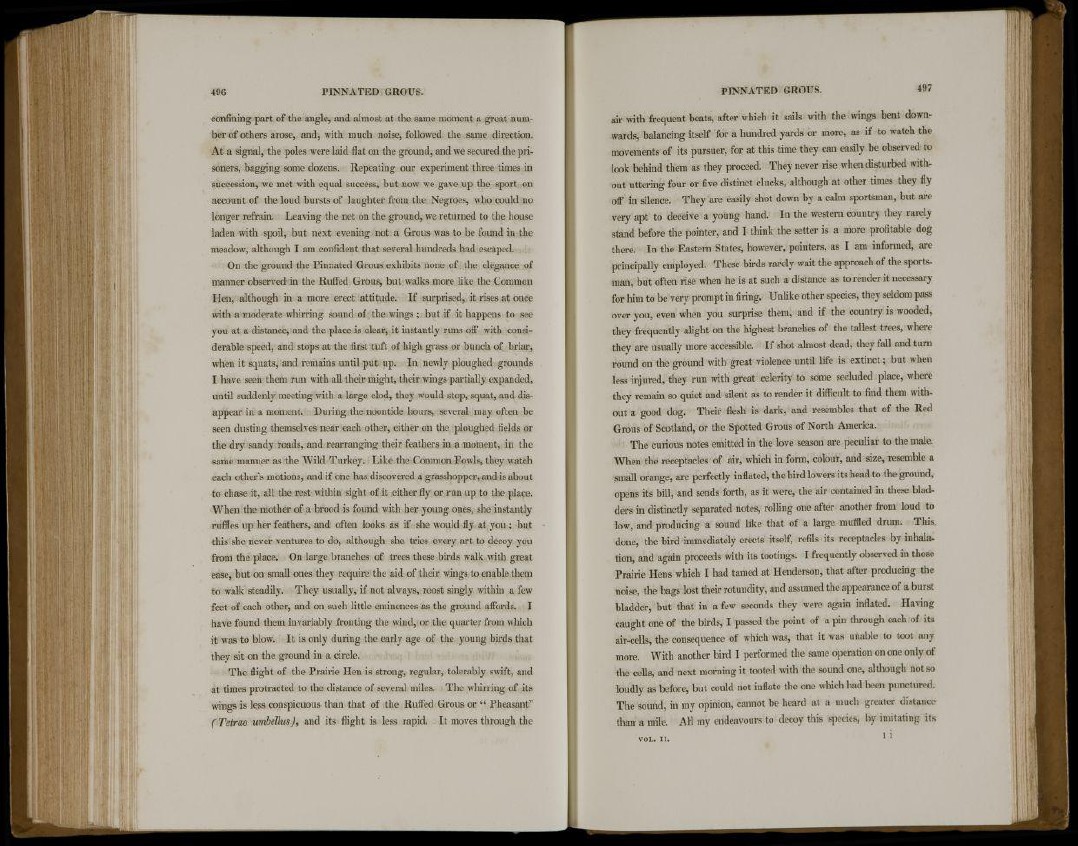
confining part of the angle, and almost at the same moment a great number
of others arose, and, with much noise, followed the same direction.
At a signal, the poles were laid flat on the ground, and we secured the prisoners,
bagging some dozens. Repeating our experiment three times in
succession, we met with equal success, but now we gave up the sport on
account of the loud bursts of laughter from the Negroes, who could no
longer refrain. Leaving the net on the ground, we returned to the house
laden with spoil, but next evening not a Grous was to be found in the
meadow, although I am confident that several hundreds had escaped.
On the ground the Pinnated Grous exhibits none of the elegance of
manner observed- in the Ruffed Grous, but walks more like the Common
Hen, although in a more erect attitude. If surprised, it rises at once
with a moderate whirring sound of the wings; but if it happens to see
you at a distance, and the place is clear, it instantly runs off with considerable
speed, and stops at the first tuft of high grass or bunch of briar,
when it squats, and remains until put up. In newly ploughed grounds
I have seen them run with all their might, their wings partially expanded,
until suddenly meeting with a large clod, they would stop, squat, and disappear
in a moment. During the noontide hours, several may often be
seen dusting themselves near each other, either on the ploughed fields or
the dry sandy roads, and rearranging their feathers in a moment, in the
same manner as the Wild Turkey. Like the Common Fowls, they watch
each other's motions, and if one has discovered a grasshopper, and is about
to chase it, all the rest within sight of it either fly or run up to the place.
When the mother of a brood is found with her young ones, she instantly
ruffles up her feathers, and often looks as if she would fly at you ; but
this she never ventures to do, although she tries every art to decoy you
from the place. On large branches of trees these birds walk with great
ease, but on small ones they require the aid of their wings to enable them
to walk steadily. They usually, if not always, roost singly within a few
feet of each other, and on such little eminences as the ground affords. I
have found them invariably fronting the wind, or the quarter from which
it was to blow. It is only during the early age of the young birds that
they sit on the ground in a circle.
The flight of the Prairie Hen is strong, regular, tolerably swift, and
at times protracted to the distance of several miles. The whirring of its
wings is less conspicuous than that of the Ruffed Grous or " Pheasant"
(Tetrao umhettusj, and its flight is less rapid. It moves through the
air with frequent beats, after which it sails with the wings bent downwards,
balancing itself for a hundred yards or more, as if to watch the
movements of its pursuer, for at this time they can easily be observed to
look behind them as they proceed. They never rise when disturbed without
uttering four or five distinct clucks, although at other times they fly
off" in silence. They are easily shot down by a calm sportsman, but are
very apt to deceive a yoUng hand. In the western country they rarely
stand before the pointer, and I think the setter is a more profitable dog
there. In the Eastern States, however, pointers, as I am informed, are
principally employed. These birds rarely wait the approach of the sportsman,
but often rise when he is at such a distance as to render it necessary
for him to be very prompt in firing. Unlike other species, they seldom pass
over you, even when you surprise them, and if the country is wooded,
they frequently alight on the highest branches of the tallest trees, where
they are usually more accessible. If shot almost dead, they fall and turn
round on the ground with great violence until life is extinct; but when
less injured, they run with great celerity to some secluded place, where
they remain so quiet and silent as to render it difficult to find them without
a good dog. Their flesh is dark, and resembles that of the Red
Grous of Scotland, or the Spotted Grous of North America.
The curious notes emitted in the love season are peculiar to the male.
When the receptacles of air, which in form, colour, and size, resemble a
small orange, are perfectly inflated, the bird lowers its head to the ground,
opens its bill, and sends forth, as it were, the air contained in these bladders
in distinctly separated notes, rolling one after another from loud to
low, and producing a sound like that of a large muffled drum. This
done, the bird immediately erects itself, refils its receptacles by inhalation,
and again proceeds with its footings. I frequently observed in those
Prairie Hens which I had tamed at Henderson, that after producing the
noise, the bags lost their rotundity, and assumed the appearance of a burst
bladder, but that in a few seconds they were again inflated. Having
caught one of the birds, I passed the point of a pin through each of its
air-cells, the consequence of which was, that it was unable to toot any
more. With another bird I performed the same operation on one only of
the cells, and next morning it tooted with the sound one, although not so
loudly as before, but could not inflate the one which had been punctured.
The sound, in my opinion, cannot be heard at a much greater distance
than a mile. All my endeavours to decoy this species, by imitating its
VOL. II. i i